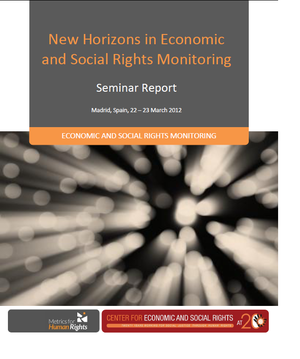New Horizons in Economic and Social Rights Monitoring (2013)
Summary: The CESR has released ‘New Horizons in Economic and Social Rights Monitoring’, which draws together the experiences of over 40 leading figures, shared at a seminar of the same name organized by CESR and Metrics for Human Rights in Development in Madrid last year. Rights-based policy monitoring requires a comprehensive, multidimensional approach that integrates a variety of tools and techniques to provide compelling evidence of rights violations and this timely report offers important insights for rights advocates and activists everywhere. It is CESR’s hope that it will facilitate more effective monitoring by economic and social rights advocates and we welcome any thoughts or reflections you may have on the report.
Offering a unique compilation of experiences from all corners of the globe, the report shows how monitoring can be used to strengthen the enforcement of economic and social rights, foster policy change, and improve people’s daily lives. Effectively monitoring economic and social rights has long been a challenge for human rights advocates and activists, thanks largely to the complexities inherent in analyzing multifaceted principles such as ‘progressive realization’ and ‘maximum available resources’. Broadly following the structure of the seminar itself, the report begins with a stock-take of progress in the field to date, exploring how different bodies, including the United Nations human rights mechanisms, national courts, and national and international NGOs, have expanded the scope of their analysis to address systemic ESCR violations and how, in response, different analytical approaches, including more quantitative approaches, are needed. It then delves into particular monitoring methods that have been developed in recent years in more detail. Questions on the use of human rights indicators, indices and benchmarks are addressed, along with budget analysis and impact assessment methodologies. CESR’s OPERA Framework – a simple but comprehensive four-step process for assessing fulfillment of economic and social rights – is also explained. Finally, it reflects on how these tools and techniques might best be deployed to address some of the key accountability gaps of the day, in the context of deepening economic recession, fiscal austerity and failures to meet development commitments.

Working Group(s):
Thematic Focus:
Related Members:
